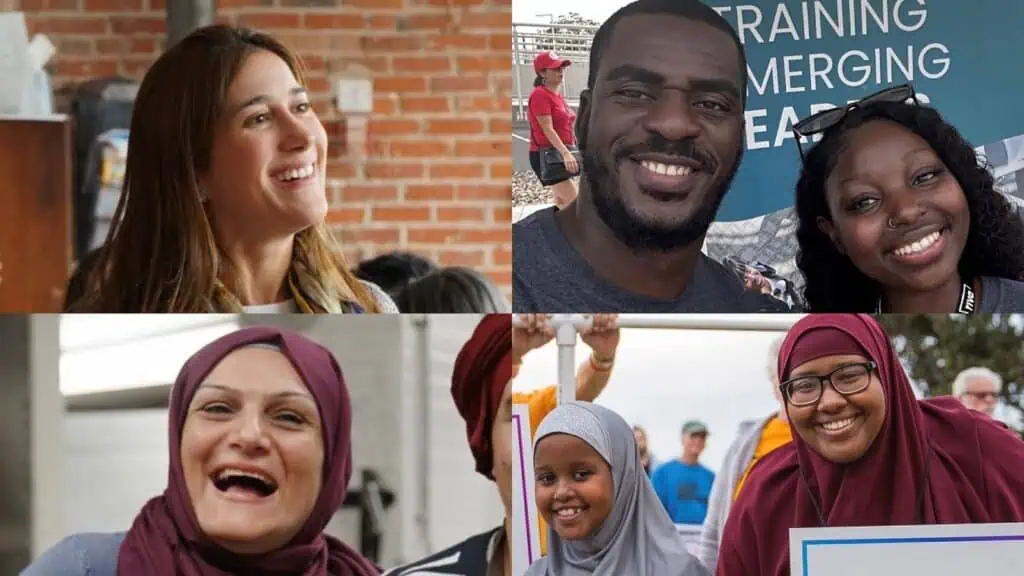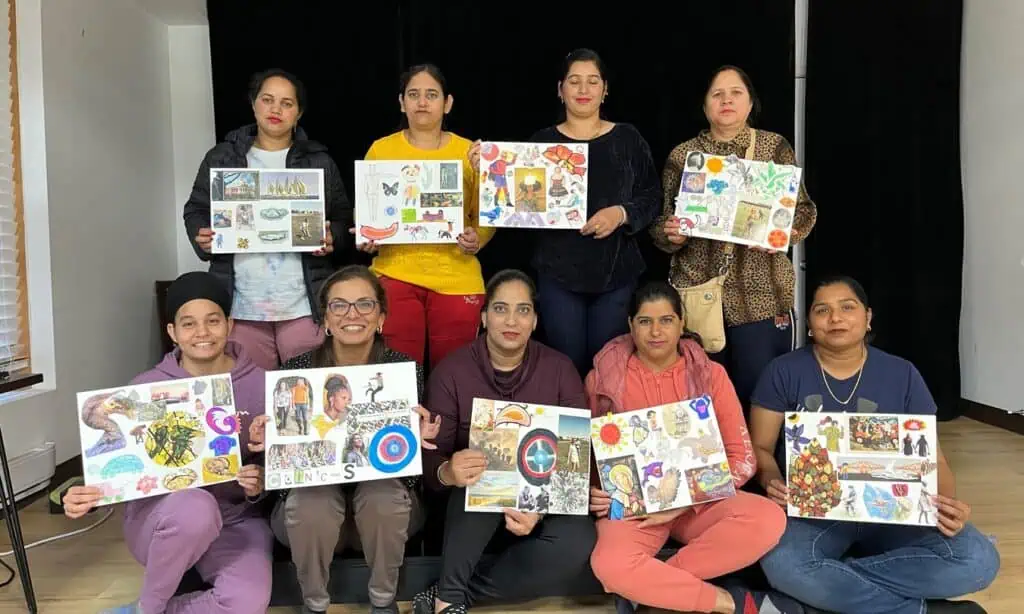Equitable Recovery for Immigrants and Refugees: Key Takeaways from WES’ Twitter Chat
Immigrants and refugees play vital roles on the front lines of the fight against COVID-19 and will continue playing essential roles to keep the U.S. moving forward. The need to address longstanding barriers to economic mobility faced by many immigrants and refugees today is therefore clear. As we look to rebuild the economy, we must ensure that the needs of immigrant and refugee workers are addressed and that recovery plans fully recognize their contributions, value, and potential.
On Tuesday, June 23, the WES Mariam Assefa Fund and WES Global Talent Bridge Program brought partners together for a Twitter chat, #ImmigrantsThrive, to discuss building an equitable economic recovery. During the conversation, organizations and leaders highlighted systemic barriers to immigrant integration and discussed policy interventions, emerging ideas, and resources that could ensure inclusive, intersectional, and dynamic solutions to support immigrants and refugees in recovery.
Here are the key takeaways that surfaced:
1. COVID-19 has highlighted the urgent need to provide adequate job training and support and ensure the safety and health of immigrant and refugee workers in low-wage jobs as economies reopen.
A4: Every job should be a quality job with fair pay and safe working conditions. Yes, every job! We need to raise standards across the board so that anyone who works full-time can make a living. #ImmigrantsThrive https://t.co/u4EQbRePmV
— Workers Defense Project (@workersdefense) June 23, 2020
A7: Reopening of the economy requires a new public health standard centered around the essential workforce of frontline #immigrant workers. There is a common interest to provide workers with the adequate training and support to maintain public health and safety. #ImmigrantsThrive pic.twitter.com/0jEzaWXch9
— Building Skills Partnership (@Building_Skills) June 23, 2020
A1: Returning to work in #COVID19 can be complex: new health & safety procedures, a need for childcare, unpredictable hours/income, and identifying safe commute options can be tough, especially for low-wage workers who are still strengthening their English. #ImmigrantsThrive https://t.co/HNtYObFH8e
— IRC – International Rescue Committee (@RESCUEorg) June 23, 2020
2. Across sectors and systems, we must center solutions around workers’ needs and perspectives and make sure immigrant and refugee workers are included as decision-makers.
A12 Leaders at all levels need proactive and compassionate approaches to meeting the needs of all immigrant communities. We must design strategies for an inclusive recovery that values and builds on the assets of all immigrant workers https://t.co/G0WCvJduKE #ImmigrantsThrive https://t.co/0xC3qBpWUK
— Jobs for the Future (JFF) (@jfftweets) June 23, 2020
A3: We’re going to have to be willing to break apart our workforce ecosystem and rebuild it for equity. Immigrants of color face greater barriers in accessing employment, training, and career advancement, and persistent digital divides will compound this. #ImmigrantsThrive https://t.co/j8ZpyI3DpP
— World Education – US (@WorldEdUS) June 23, 2020
A3: One of the best ways to bring equity lens and ensure recognition and inclusion is to hire staff that represent the communities that they serve. #ImmigrantsThrive https://t.co/iWJsyot2s5
— JVS Boston (@JVSBoston) June 23, 2020
3. The federal government has excluded many immigrant communities in its response to COVID-19, leaving states and locales to pick up the slack. More equitable policy solutions are necessary at federal, state, and local levels.
A11: The U.S. can take a page from countries like New Zealand, Canada, and Germany, who increasingly recognize the important federal role in building inclusion, belonging, and cohesion. #ImmigrantsThrivehttps://t.co/MNX5DBQa3U
— Welcoming America (@WelcomingUSA) June 23, 2020
A11: Flexibility in approach and access, including flowing funds through non traditional channels and cbos who are entrenched in the community. Lift restrictions and cumbersome requirements #immigrantsthrive
— Catalyst of San Diego & Imperial Counties (@SDCatalyst) June 23, 2020
A11. Federal funding should be responsive to the crisis by addressing labor needs in essential industries w/inclusive training options for immigrant communities. Follow our partners @SkillsCoalition to keep up with the latest updates on federal investments. #ImmigrantsThrive https://t.co/minER7OjBH
— WES Global Talent Bridge (@WESGlobalTalent) June 23, 2020
4. Several immigrant-serving organizations offer resources on policies and programs to build inclusive state and local economies for immigrants and refugees.
We have curated a list of best policy practices State & Local governments are taking to ensure emergency responses-from expanding healthcare access to increasing economic support-are accessible, culturally competent, and welcoming to all. #ImmigrantsThrive https://t.co/TxhB5z3EzV https://t.co/zfi9yS019N
— American Immigration Council – State and Local (@immcouncilSL) June 23, 2020
A5: We’ve got tons of ideas on this one! Check out our COVID-19 response policy platform to see what we’re fighting for in Texas: https://t.co/cTrF69HRRs #ImmigrantsThrive https://t.co/p8BwDaxwML
— Workers Defense Project (@workersdefense) June 23, 2020
A7: In our Welcoming Economies toolkit with @GlobalDET, we provide 4 steps to integrating immigrants in local econ. development: Be a champion. Be a connector. Fill program gaps. Make it your own: https://t.co/8Uip1fEwSs#ImmigrantsThrive pic.twitter.com/XKEezWuKtm
— Welcoming America (@WelcomingUSA) June 23, 2020
5. Philanthropic funders can play a role in filling gaps in federal support and ensure that immigrants and refugees are not left out of recovery solutions. Philanthropy can step in and fund different kinds of solutions that put workers at the center.
A10: Support/fund incentives otherwise not supported by government or private sector – wrap around services, living stipends, child-care, #ImmigrantsThrive
— bzeidman (@bzeidman) June 23, 2020
A11/ One hurdle to federal support is lack of cultural sensitivity. PPP & EIDL are out of alignment with the faith of many Muslim immigrants & refugees. Philanthropy & #impinv can help close the gap, but shouldn't have to if policy was intentionally inclusive. #immigrantsthrive https://t.co/Ttr1KXDUsr
— Lauren Grattan (@cheeseaugrattan) June 23, 2020
A10: Recovery will be a marathon, not a sprint. Funding should reflect this. Philanthropy can help as thought partners, connectors, and in providing longer-term investments. #ImmigrantsThrive
— NPNA (@npnewamericans) June 23, 2020
6. The COVID-19 recovery phase provides a window of opportunity for employers to shift practices to be inclusive of immigrant talent.
A8: Another emerging idea that companies can implement NOW: create (micro)-internships, job shadowing and apprenticeship programs to support immigrant and refugee talent and build pipelines. More here: https://t.co/g0owpDTwRM#ImmigrantsThrive
— Upwardly Global (@UpwardlyGlobal) June 23, 2020
Learning & skill-building initiatives that support the upskilling needs of immigrants are a win-win for workers + employers. @jfftweets research notes companies who invest in ESOL adult learning programs see a 123% return on investment #ImmigrantsThrive https://t.co/9ZhKnioz84 https://t.co/v1nWHE665Y
— Monica Munn (@MonicaKMunn) June 23, 2020
A6. Fortunately, a number of solutions are emerging that have the ability to benefit companies and workers alike. One solution that shows strong results is building underrepresented worker populations into your company’s talent strategyhttps://t.co/vM9T68n80S #ImmigrantsThrive https://t.co/UrFKky7Wyg
— Jobs for the Future (JFF) (@jfftweets) June 23, 2020
7. As the role of technology in the workplace grows, divides in digital literacy, access, equipment, and infrastructure must be addressed to ensure equitable opportunities for immigrants and refugees.
A1: As workforce training goes online, #immigrants & #refugees need affordable access to equipment, broadband and training to improve their digital literacy. This @skillscoalition report shows why. https://t.co/gXRYKpfb8p #immigrantsThrive
— Beeck Center (@BeeckCenter) June 23, 2020
A8: For one, make sure workers that are able to are set up to work remotely – that means technology access as well as the digital literacy needed to complete the same job in a different way.
— Laura Roberts (@_lauramaye) June 23, 2020
A8: Employers can enable closed captioning for all webinars and meetings. It is also important to create opportunities for everyone to engage & have their voice heard. Utilize various methods such as polls, chat box questions, & individual check-in’s. #ImmigrantsThrive https://t.co/kntSWXB3so
— Advancing Equity at the Y (@GlobalYMCA) June 23, 2020
A8: Immigrants and refugees have inequitable access to developing digital skills both at work and in our training institutions. Employers must ensure all their employees have technology access and develop essential digital skills. They can @JoinDigitalUS #ImmigrantsThrive
— World Education – US (@WorldEdUS) June 23, 2020
8. Cross-sector partnerships and collaborative efforts can help fund and implement immigrant-inclusive workforce training solutions and career pathways.
A9: Blended finance has helped to address social challenges in the past. By combining philanthropic, public and private funds, we can bring stronger pools of capital to immigrants and refugees. #ImmigrantsThrive
— Beeck Center (@BeeckCenter) June 23, 2020
A5. Equitable recovery for immigrants and refugees will require collaborative efforts from the public and private sector to invest in upskilling and bridge programming so that no one is left behind. #ImmigrantsThrive https://t.co/z5SDAc81Ux
— IMPRINT (@IMPRINTproject) June 23, 2020
In Philadelphia, an innovative pay-for-success partnership between @comcast and @Philaworks started last year.
More private public partnerships like these are need to help workers reskill and upskilling. #immigrantsthrive https://t.co/sDCFsaI3hi
— Ashley Putnam (@AshleyAPutnam) June 23, 2020
9. Three million refugees have resettled in the U.S. since the launch of the U.S. Refugee Resettlement Program 40 years ago. As we build solutions, we must recognize there are challenges that are unique to refugee workers.
A.2: Lack of knowledge in navigating the US system and needing extra support from refugee resettlement agencies and other community stakeholders. Longer term services during COVID are needed. #ImmigrantsThrive
— Cristina Alaniz (@Cristin47040956) June 23, 2020
Biggest challenge to refugee workers is navigating a society that sees their belonging as tenuous & conditional. If we fix that problem for all our neighbors, we can spend less time solving for the downstream impacts of racism and more time building an innovative workforce.
— Rachel Peric (@RachelPeric) June 23, 2020
A2: for resettled refugees pursuing careers as entrepreneurs, many of whom are black and brown and/or women, the biases they face are often stacked against them, particularly when it comes to accessing capital, venture support networks, mentorship, and housing. #immigrantsthrive
— John Kluge 🐝 (@klugesan) June 23, 2020
A2: Language access – or providing important documents and materials in different languages – is a unique challenge for newer refugees, in addition to the cultural nuances and network building in a new country. #ImmigrantsThrive
— Welcoming America (@WelcomingUSA) June 23, 2020
10. Immigrants and refugees represent a diverse group of people. It’s important to elevate their unique voices and to acknowledge that recovery will vary across different cities, states, and sectors.
A12: Tell diverse stories. Immigrants & refugees come from thousands of places, work in thousands of occupations, and each have a unique experience. Lifting up these experiences is critical to ensure that policies and investments meet these diverse needs! #ImmigrantsThrive https://t.co/wrknKCbhIi
— IRC – International Rescue Committee (@RESCUEorg) June 23, 2020
A6: Equitable recovery inclusive of immigrants and refugees needs to be adaptive and responsive to local context and directly informed by needs of these communities. #immigrantsthrive
— John Kluge 🐝 (@klugesan) June 23, 2020
Yes, and funding should be representative of the demographics of the local community. https://t.co/ks6Xq3LZca
— NCRP (@NCRP) June 23, 2020
Thank you to all participating organizations! We encourage readers to continue to share and discuss why immigrants and refugees are essential to the U.S.’s COVID-19 response and how they can contribute to the economic recovery now and beyond the pandemic.
Participating organizations:
Beeck Center for Social Impact + Innovation
Building Skills Partnership
Community College Consortium of Immigrant Education
Center for Immigrant Education & Training (CIET) at LaGuardia Community College
Church World Service
Coalition on Adult Basic Education
Federal Bank of Philadelphia
Global Cleveland
Global Switchboard
International Institute of Buffalo
International Institute of St. Louis
Interfaith Immigration Coalition
Immigrant Learning Center
IMPRINT Coalition
International Rescue Committee
JFF
JVS Boston
Mission Driven Finance
Mission Investors Exchange
Massachusetts Immigrant and Refugee Advocacy Coalition
National Committee on Responsive Philanthropy
National Immigration Forum
New American Economy
National Partnership for New Americans
Portland Office of Economic Opportunity
Refugees International
Refugee Congress
Refugee Council USA
Refugee Investment Network
Riverside Language
San Diego Grantmakers
San Diego Workforce Partnership
Tent Partnership
Upwardly Global
Welcoming America
Welcoming Center for New Pennsylvanians
Workers Defense Project
Workforce Matters Funders Group
World Education
YMCA




